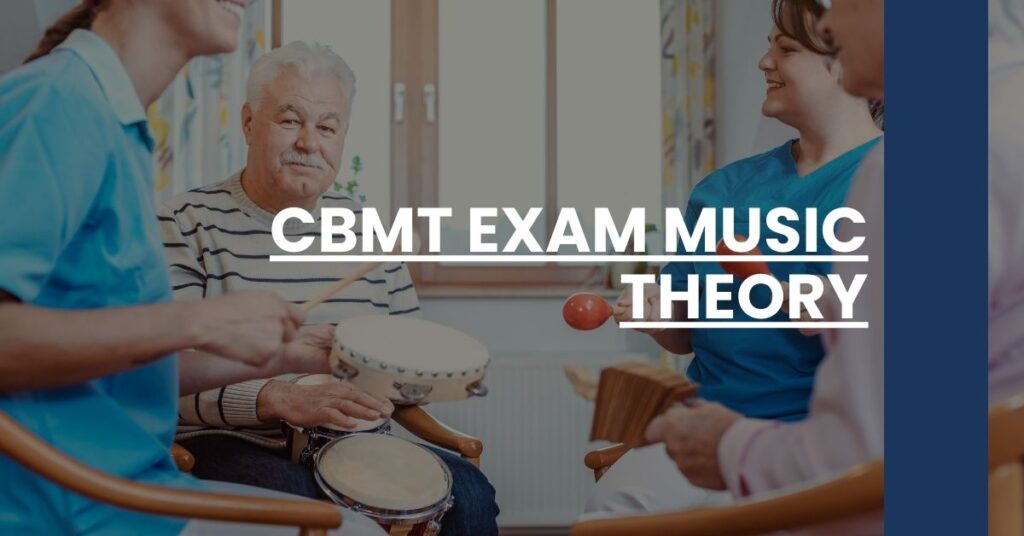Master your CBMT exam music theory with ease.
- Focused Study: Target key concepts in music theory that are critical for the CBMT exam.
- Efficient Learning: Utilize strategic study methods and materials tailored for music theory success.
- Exam Confidence: Boost your test-taking skills with practical music theory practice and tips.
Ace your CBMT exam music theory section with confidence.
- Understanding the CBMT Exam
- Importance of Music Theory in the CBMT Exam
- Key Music Theory Topics Covered in the CBMT Exam
- Tips for Studying Music Theory
- Practice Strategies for Music Theory Questions
- Test-Taking Techniques for the CBMT Exam
- Resources for CBMT Exam Preparation
- Preparing for the Day of the Exam
- Conclusion: Next Steps After the CBMT Exam
Understanding the CBMT Exam
The Certification Board for Music Therapists (CBMT) Exam is a significant milestone for aspiring music therapists aiming to acquire the MT-BC (Music Therapist – Board Certified) credential. The exam evaluates your knowledge and skills across a range of domains essential for therapeutic practice, including music theory, which forms the bedrock for clinical work. Understanding this exam is crucial—it’s the gateway that ensures you’re equipped to use music as a therapeutic tool with diverse client populations.
What is the MT-BC Credential?
The MT-BC credential is a testament to your expertise and commitment to the field of music therapy. By passing the CBMT Exam, you join a community of professionals recognized for their adherence to the highest standards of practice.
Structure of the CBMT Exam
The CBMT Exam is comprehensive, encompassing both clinical knowledge and music competency. It challenges you to apply theoretical concepts through practical scenarios, ensuring that certified therapists are well-rounded and proficient.
Why is the CBMT Exam Important?
Earning the MT-BC credential through the CBMT Exam boosts your credibility, potentially opening doors for advanced career opportunities and enhanced trust from clients and colleagues.
Importance of Music Theory in the CBMT Exam
A profound understanding of music theory is essential not only for passing the CBMT exam but also for effective clinical interventions as a music therapist. Music theory encompasses the language of music; it’s the set of tools you will use to assess, plan, and implement music therapy sessions tailored to your clients’ needs.
Why Music Theory Matters
Music theory is the backbone of all music-related decisions you’ll make in therapy. Whether creating custom interventions or improvising in the moment, a strong grasp on music theory elements can profoundly influence therapeutic outcomes.
Key Music Theory Topics Covered in the CBMT Exam
As you prepare for the CBMT exam, focus on crucial music theory topics. These are the foundation stones for your practice as a music therapist, and a solid grasp of them is indispensable.
- Music Fundamental Key Points: Knowledge of scales, chords, and key signatures is mandatory. You should be able to read and write musical notation with accuracy.
- Analytical Skills: Expect to analyze chord progressions and melodies. This will demonstrate your understanding of harmonic and melodic structures, which is critical in designing therapeutic music experiences.
- Performance Skills: Although not purely theoretical, your ability to apply theory through instrumentation is essential. Be prepared to showcase competencies in playing instruments and voice use.
Tips for Studying Music Theory
Studying music theory for the CBMT exam can seem daunting at first glance, but with structured approaches and the right resources, you can master the necessary concepts efficiently.
Develop a Study Plan
Create a plan that allows you to cover all music theory topics. Dedicate time slots to different themes and stick to your schedule. Religiously revising each aspect can solidify your understanding and recall.
Explore Diverse Resources
Dive into an array of resources. Use textbooks, online tutorials, and self-assessment exams provided by CBMT as your guideposts. They offer structured information and practice material to test your knowledge.
Active Learning Techniques
Engage with the material actively. Writing out scales, constructing chords, and analyzing existing pieces of music can immensely bolster your comprehension. Combine visual, auditory, and kinesthetic learning methods to aid memorization and understanding.
Utilize Practice Questions
Familiarize yourself with the structure and type of questions you might encounter. Work through practice questions or past CBMT music theory exams to gauge your proficiency level and identify areas needing more focus.
By intertwining these study strategies into your preparation, you are not just preparing to pass the CBMT exam but laying a robust foundation for a successful music therapy career.
Practice Strategies for Music Theory Questions
When preparing for the CBMT exam music theory section, your approach to practice could make all the difference. A methodical strategy can help solidify your understanding and boost your ability to tackle exam questions effectively.
Familiarize Yourself with Exam Formats
You need to become comfortable with the exam format to avoid any surprises on the day of the CBMT exam. Different question types assess various music theory skills, and you must be ready for each one.
- Multiple-choice Questions: These usually test your memorization and quick recall abilities.
- Short Answer: You might be asked to elaborate on music theory concepts or give brief examples illustrating your point.
- Practical Questions: Be prepared for questions that require you to demonstrate your understanding through analysis or creation of musical scores.
Adopt a Tactical Approach to Practice
When it comes to the CBMT exam music theory, be smart about your practice.
- Simulate Exam Conditions: Recreate the testing environment at home. Time yourself and practice without any study aids.
- Target Weak Areas: Identify your weak points and spend extra time reinforcing those aspects of music theory.
- Use Flashcards: They’re a time-tested method for efficiently memorizing terms, definitions, and concepts.
- Peer Study: Collaborate with others preparing for the exam. Explaining concepts to peers can reinforce your own knowledge.
Remember, repetition is key. The more you practice, the more familiar you become with the types of questions and the faster you can identify the correct answers.
Review, Reflect, and Refine
After each practice session, take time to reflect on your performance.
- Review Your Answers: Especially the ones you got wrong. Understanding your mistakes is critical for improvement
- Look for Patterns: Are there specific types of questions you struggle with? Use this insight to focus your study plan.
- Refine Your Knowledge: If you noticed gaps, revisit those topics and try different methods to grasp the material better.
Test-Taking Techniques for the CBMT Exam
The right test-taking strategies can help you navigate through the CBMT exam with confidence, managing both time and stress effectively.
Time Management Strategies
Each question counts, so pacing yourself is vital.
- Read Carefully: Skim each question first, then read it fully to avoid missing key information.
- Prioritize Questions: Answer the questions you know first to secure those marks and build confidence.
- Plan Your Time: Divide the exam duration by the number of questions to understand how much time to allocate for each.
Stress Management Techniques
Keeping your cool can lead to a clearer mind and better performance.
- Deep Breathing: Practice deep breathing exercises to calm your nerves before and during the exam.
- Positive Visualization: Imagine yourself succeeding and remaining calm throughout the exam.
- Stay Hydrated: Drink water before and during the exam to stay refreshed and maintain focus.
Remember, your mental and physical well-being on the exam day can be just as important as your knowledge level.
Resources for CBMT Exam Preparation
A vast array of resources is available to help you prepare, especially for the CBMT exam music theory component.
- CBMT Self-Assessment Exams (SAEs): The official SAEs provided by CBMT are invaluable in gauging your exam readiness.
- Theory Textbooks: Source books used in undergraduate music therapy programs for in-depth theory study.
- Online Courses: There are many online courses tailored to the CBMT exam that can help reinforce your music theory knowledge.
- Study Groups: Participating in or forming study groups can offer support and diverse perspectives on the material.
Combining resources like textbooks, online platforms, and engaging with your peers can round out your study approach and enhance knowledge retention.
Preparing for the Day of the Exam
Your exam day preparation is the final step towards ensuring optimal performance.
- Get Adequate Sleep: Make sure to get a good night’s rest before the exam day to make sure you are alert and focused.
- Check Your Exam Kit: Gather necessary items such as your ID, pencils, and erasers the night before.
- Plan your Route: Know the exact location of the exam center and how long it will take to get there, factoring in any potential delays.
These preparations can help to reduce last-minute stress and allow you to focus entirely on the task at hand.
Conclusion: Next Steps After the CBMT Exam
The journey doesn’t end with the CBMT exam. Once passed, you’ll have validated your expertise in music theory and other core areas, proving your readiness as a board-certified music therapist. This accreditation opens up an enriching career path, offering opportunities for continued professional growth. Continue to deepen your knowledge, keep abreast of the latest research and practices, and connect with a community of professionals. Remember, the CBMT exam is not just a test—it’s a springboard for your fulfilling career in music therapy.
Ace the CBMT exam music theory section with our comprehensive guide, mastering key concepts and test strategies for success.

